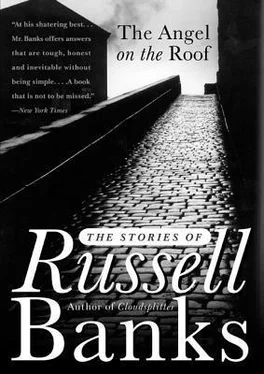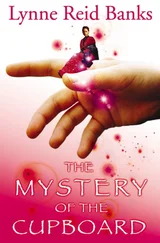The bob-house is only as large as need be, six feet by four feet is enough, and six feet high for a normal-sized person. At one end is a door with a high step-over sill to keep out the wind, and at the other a homemade woodstove. Along one of the long walls is a narrow bench that serves as a seat and also a bed when you want to nap or sleep over the night. Your traps and lines are set up along the opposite wall. There is a small window opening, but it remains covered by a hinged, wooden panel, keeping the bob-house in total darkness. When no light enters the bob-house, you can sit inside and peer through the holes in the ice and see clearly the world below. You see what the fish see, and you see them, too. But they cannot see you. You see the muddy lake bottom, undulating weeds, and decaying leaves, and, in a cold, green light, you see small schools of bluegills drift over the weed beds in search of food and oxygen, and coming along behind them three or four pickerel glide into view, looking for stragglers. Here and there a batch of yellow perch cruise past, and slowly, sleepily, a black bass. The light filtered through the ice is still, hard, and cold, like an algebraic equation, and you can watch the world pass through it with a clarity, objectivity, and love that is usually thought to be the exclusive prerogative of gods.
Until one winter a few years ago, Merle Ring was not taken very seriously by the other residents of the trailerpark. He was viewed as peculiar and slightly troublesome, mainly because, while he had opinions on everything and about everyone, when he expressed those opinions, which he did frequently, he didn’t make much sense to people and seemed almost to be making fun of them. For instance, he told Doreen Tiede, who was having difficulties with her ex-husband, Buck, that the only way to make him cease behaving the way he had behaved back when he was her husband, that is, as a drunken, brutal crybaby, was to get herself a new husband. “Who?” she asked him. They were in the car, and she was giving Merle a lift into town on her way to work at the tannery. Her daughter, Maureen, headed to the baby-sitter for the day, was in the back, where she was unaccustomed to sitting. Doreen laughed lightly and said it again, “Really, Merle, who should I marry?”
“It don’t matter. Just get yourself a new husband. That way you’ll get rid of Buck. Because he won’t believe you’re not his wife until you’re someone else’s.” He looked out the window at the birches alongside the road, leafless and gold-tinted in the morning sun. “That’s how I always did it,” he said.
“What?” She was clasping and unclasping the steering wheel as if her fingers were stiff and cold. This business with her ex-husband really bothered her, and it was hurting Maureen.
“Whenever I wanted to get rid of a wife, I married another. Once you’re over a certain age and have got yourself married, you stay married the rest of your life, unless the one you happened to be married to ups and dies. Then you can be single again.”
“Maybe Buck’ll up and die on me, then,” she said with a quick grimace.
“Mommy!” the child said and stuck her thumb in her mouth.
“I was only joking, sweets.” Doreen looked into the rearview mirror. “And stop sucking your thumb. You’re too old for that.” Then, to Merle: “Is that how you got to be single, after all those wives? How many, six, seven?”
“Numerous. Yup, the last one died. Just in time, too, because I was all set to get married again.”
“To who?”
“Oh, I don’t know. I didn’t have anybody in particular in mind at the time. But I sure was eager to get that last one off my back.”
“Jesus, Merle, isn’t anything sacred to you?”
“Sure.”
“For instance.”
“Marriage, for instance. But not husbands or wives,” he quickly added.
“I can’t take you seriously, Merle,” she said, and they drove on in silence.
That was the form most of his conversations took. It didn’t matter whom he was talking to, Merle’s observations and opinions left you feeling puzzled, a little hurt and irritated. To avoid those feelings most people told themselves and each other that Merle “wasn’t all there,” that he didn’t really understand how complicated life was, and that he really didn’t like anyone, anyhow. But because he was orderly and quiet and, like most small, neat, symmetrical men, physically attractive, and because his financial life was under control, he was accepted into the community. Also, he didn’t seem to care one way or the other if you took him seriously or if you followed his advice, and, as a result, Merle was never an agitated man, which, naturally, made him an attractive neighbor. No one thought him a particularly useful neighbor, however.
Until he won the state lottery, that is. That same October morning, the morning he saw the first ice on the lake and a little later had the brief conversation with Doreen Tiede concerning her ex-husband, Buck, he purchased, as he did every month, a one-dollar lottery ticket. It was a habit for Merle, ever since the state first introduced the lottery back in the 1960s, to go into town the day after his social security check arrived in the mail, cash his check at the bank, and on the way home stop at the state liquor store and buy a fifth of Canadian Club and a single lottery ticket. There were several types available, but Merle preferred the Daily Numbers Game, in which you play a four-digit number for the day. The winning number would be printed the next morning in the Manchester Union Leader . For your one-dollar bet, the payoff on four digits in the exact order was $4,500. At that point, your number went into another lottery, the Grand Prize Drawing, made later in the year, for $50,000. Merle won $4,500, and here’s how he did it. He bet his exact age, 7789—on October 30, 1978, he was seventy-seven years, eight months, nine days old. He had always bet his age, which of course meant that the number he played varied slightly, but systematically, from one month to the next. He claimed it was on principle, for he did not believe, on the one hand, in wholly giving over to chance or impulse or, on the other, in relying absolutely on a fixed number. It was a compromise, a realistic compromise, in Merle’s mind, between randomness and control, two extremes that, he felt, led to the same place— superstition. There were, of course, three months a year when, because he was limited to selecting four single-digit numbers, he could not play his exact age, and in those months, December, January, and February, he did not buy a ticket. But those were the months he spent ice-fishing, and it seemed somehow wrong to him, to gamble on numbers when you were ice-fishing. At least, that’s how he explained it.
Merle took his $4,500, paid the tax on it, and spent about $250 refurbishing his bob-house. It needed a new floor and roof and a paint job, and many interior fixtures had fallen into disrepair. The rest of the money he gave away, as loans, of course, but Merle once said that he never loaned money he couldn’t afford to give away, and as a result of this attitude, no one felt especially obliged to pay him back. Throughout November, Merle hammered and sawed away at his bob-house, while people from the trailerpark came and went, congratulating him on his good luck, explaining their great, sudden need for $300 or $400 or $500, then, while he counted out the bills, thanking him profusely for the loan. He kept his prize money inside a cigar box in his toolbox, a huge, locked wooden crate far too heavy for fewer than four men to carry and located just inside the door to his trailer.
Meanwhile, the ice on the lake gradually thickened and spread out from the coves and shallows, creeping over the dark water like a pale shadow. Merle’s bob-house was a handsome, carefully fitted structure. The bottom sills had been cut to serve as runners, so that Merle could push the building out onto the ice alone. The interior was like a ship’s cabin, with hinged shelves and lockers, hooks and drawers, a small woodstove made from a twenty-five-gallon metal drum, a padded bunk that folded against the wall when not in use, and so on. The interior wood, white pine, had been left raw and over the years had darkened from woodsmoke and moisture to the color of old briar. The exterior, of lapstrake construction to stave off the wind, Merle covered with a deep red stain. The pitched roof was of new, unstained, cedar shingles the color of golden palomino that would silver out by spring.
Читать дальше












